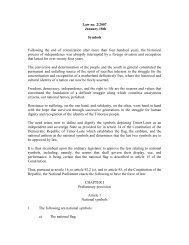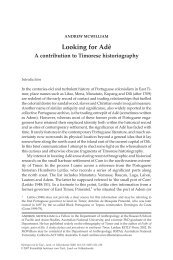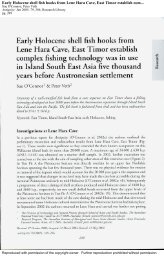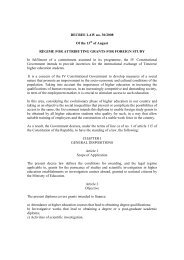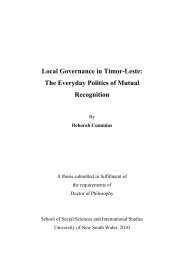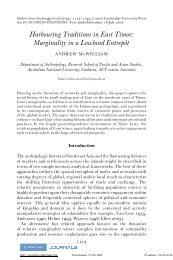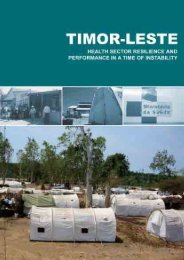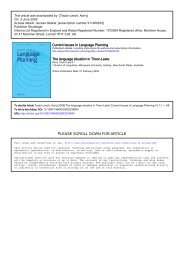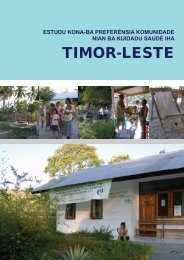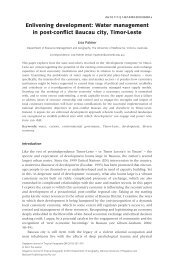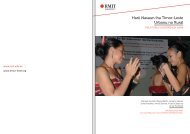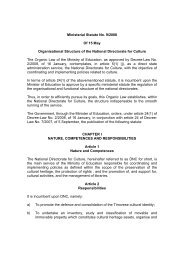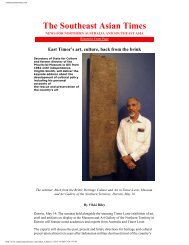Timor-Leste Health Care Seeking Behaviour Study - Secretaria de ...
Timor-Leste Health Care Seeking Behaviour Study - Secretaria de ...
Timor-Leste Health Care Seeking Behaviour Study - Secretaria de ...
- No tags were found...
Create successful ePaper yourself
Turn your PDF publications into a flip-book with our unique Google optimized e-Paper software.
Box 2: Midwife <strong>de</strong>monstrates care ofmother and babyEarlier, what did you mean when you saidthey [midwife, district-level CHC] servedyou well?Giving birth at home or in a hospital is notthe same. At home you feel pain for a longtime, no joke, and the TBA spits [betel leafand areca nut onto the mother’s skin] andthe baby is born, or not. Those who givebirth in a hospital are given injections sothat their contractions are not painful, andthey are served/looked after [by staff].During <strong>de</strong>livery they look after you so thatcontractions aren’t painful, then after thebirth, they bathe the baby and put it tosleep somewhere – I don’t know where,and they also give hot water to the motherfor bathing herself, as well as food and milk.The mother feels content because she andher baby are well looked after by the staff.Adolescent woman, FGD, LautemBox 3: Provi<strong>de</strong>r flexibility towardspatients who have travelled longdistances...So the clinic [sub-district level CHC] isopen until 11am?It’s open until 2pm.If it is not an emergency but a person hasa normal sickness can people still come,or what?If people still arrive we continue to servethem if they live far from the healthfacility. We ask them where they live andask why they arrived late. If they say: ‘Ilive far away’ we continue to serve them.For those who live nearby the facility andarrive late we send them to read theopening hours for the clinic 8am-2pm [andtell them] you must attend within thesehours unless it is an emergency. Like thiswe avoid the possibility of complaints[from users] and continue to treat them.In-<strong>de</strong>pth interview, midwife, Oecusse<strong>Timor</strong>-<strong>Leste</strong> <strong>Health</strong> <strong>Care</strong> <strong>Seeking</strong> <strong>Behaviour</strong> <strong>Study</strong> | 2009Patients appreciated being given priority in urgent cases, e.g. a knife injury with bleeding or a highfever. They also appreciated being asked to give permission for surgery, such as a caesarean section,before this was to be performed. They were also encouraged by provi<strong>de</strong>rs ‘serving’ or looking afterthem (mentioned as melayani; see Box 2). Other positive examples inclu<strong>de</strong>d provi<strong>de</strong>rs who invitedthe patient to sit down after a long journey, advised them to walk home slowly and rest on the way,or were willing to see them even if they had left their patient card at home (see Box 3).4.2.6 Equipment and staffIn <strong>de</strong>ciding where to go for help, people wanted facilities that were equipped with basic diagnosticand procedural equipment and staffed by qualified and well-trained staff; several indicated apreference for seeing a doctor.Community members spoke of the need for scales (for weighing babies and adults with conditionscausing weight loss such as TB), a stethoscope, an ophthalmoscope (to look into the patient’s eyes),and laboratory equipment for screening blood for malaria and sputum (kaben tasak) for TB. Inrelation to screening for malaria, one user sought out a health facility that provi<strong>de</strong>d immediate testresults.Similar consi<strong>de</strong>rations were raised in talking about child birth. Families appreciated oxygenequipment for women with breathing difficulties, a sphygmomanometer (for monitoring bloodpressure), drugs for stopping post-partum haemorrhage and transfusion equipment for severe31



